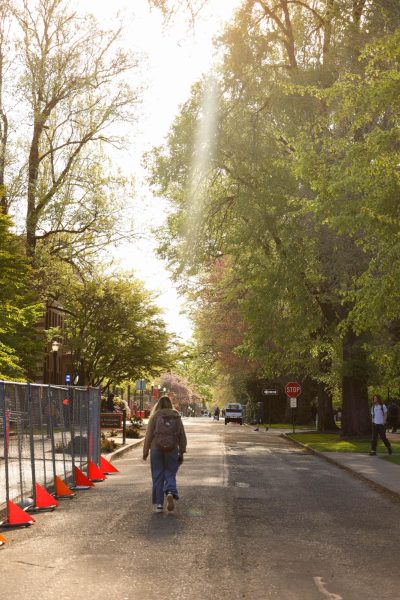Ask Dr. Tech: Learning curves ahead
January 27, 2016
So what do you know? Is there any measure to determine how much you know? If you needed to know something would you know how to learn it?
Your answers to these questions matter more than any set of information that you memorize in school.
The reason is that the sum of knowledge is growing at an ever increasing rate.
The growing rate of knowledge was described by philosopher/inventor/genius Buckminster Fuller, whom you should learn about.
In his 1982 book “Critical Path” Fuller presented an analysis of collective knowledge based on scientific and technical milestones through history.
He assigned values to the earliest known innovations, tools of the Stone Age going back 3 million years, up to the year 1 CE and designated that value a “knowledge unit.”
Using that measure he found that it took about 1,500 years from 1 CE for that knowledge unit to double to 2 knowledge units.
It doubled again 250 years later to 4 knowledge units and again in 150 years, around the year 1900, to 8 knowledge units.
Other thinkers have used Fuller’s analysis to extrapolate that by the year 2000 collective human knowledge was doubling every year.
Some observers project that with coming changes in our information networks, such as the internet of things (IOT), total knowledge doubling will occur on a daily or even hourly basis.
Using this system it follows that the pace at which human knowledge is accumulated is accelerating; not only is the amount of total knowledge increasing but also its rate of growth.
Is there a natural or functional limit to knowledge acceleration? We do not know.
In some respects self-knowledge is one of our areas of greatest ignorance.
Just months ago our species learned something new about ourselves – that each individual’s brain memory power is greater by an order of magnitude; a factor of 10, than previously believed.
In 2015 Thomas Bartol and associates of the Salk Institute reported that the anatomic structures of the trillions of synapses in the brain support a carrying capacity measured in petabytes – millions of gigabytes.
This finding is important because in addition to the amount of available storage it reveals sophisticated synaptic processes that use probability to create and retrieve memory.
Goggle the title of the paper, “Nanoconnectomic upper bound on the variability of synaptic plasticity,” or just “10 times brain capacity” for more on this amazing topic.
This discovery has powerful significance for the future of learning and the future of computer design.
New knowledge about the brain is a powerful source of inspiration in other fields of study.
A popular analogy is to compare the human brain to a computer.
It is a strong analogy in ways because computers were invented to mimic some of what the brain does.
Some people leap beyond the analogy to claim that the brain actually is a computer.
A problem with that conclusion is that we know exactly how computers work but we do not know how the brain works.
If the brain were a computer we would be able explain the brain in detail and build one from scratch, but we cannot do that at present.
The realm of possible knowledge is indefinitely vast and as we continue to learn about the universe and ourselves it remains clear that each of us has untapped potentials to explore.
The fact that knowledge is increasing rapidly does not imply that our intelligence is unable to handle it.
Creating strategies for managing complex information is what intelligent organisms like us do.
The acceleration of human knowledge does imply that the primary skill of a future knowledge worker will be research, analysis and synthesis of the not-yet-known.
You will succeed at your job by finding relevant streams of data, turning it into meaningful information from which you will produce usable knowledge.
At present that set of intellectual skills is the realm of the expert who is typically hired as a consultant.
In the near future those forms of expertise will be the foundations of all knowledge work because every career will consist of navigating a steep learning curve in the face of the accelerating velocity of knowledge.
The knowledge that drives your field will have changed significantly by the time you start the job won via your degree.
Your core strength in that job will be your capability to learn.
You can hone that capability now in your work at OSU, but to do so you must color outside of the lines of specialization.
Here are three practical ways that you may ramp up your learning prowess.
First, treat all of your learning as valuable. The process of learning anything strengthens your capabilities for learning something new. It is short sighted to negate a learning experience just because you do not see value in the information. You are not a giant flash drive for storing information. You are a learning organism that can grow and adapt to changing conditions.
Second, broaden your range of learning. Mastering subjects in depth is powerful and so is challenging your mind with subjects outside of your specialty. As the sum of human knowledge grows its complexity increases. Diversifying your learning experiences inculcates stronger strategies for managing complexity.
Third, plan to keep on learning. A degree is not a finishing line, it is a portal to new learning in new contexts. Set your sights on a continual path of life-long learning beyond any program or position and you will increasingly thrive in a world of complexity that many people find overwhelming.
Some time soon you will wake up each day to a job that is already obsolete, but you will not be obsolete because of your skill at navigating the raising rate of cognitive change.
Human knowledge is growing at a scale that is hard to measure and so are you.
The opinion’s expressed in Dorbolo’s column do not necessarily reflect those of The Daily Barometer staff.





















































































































